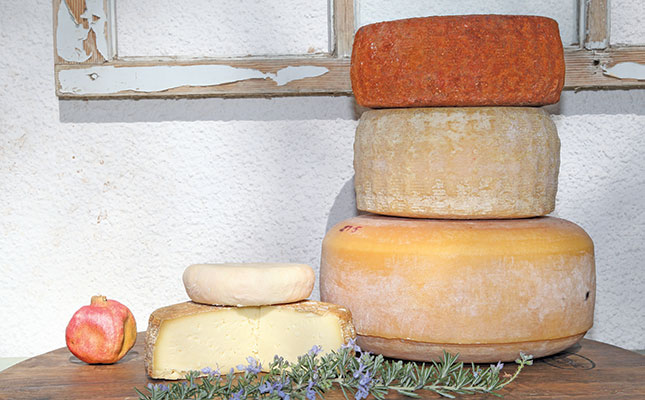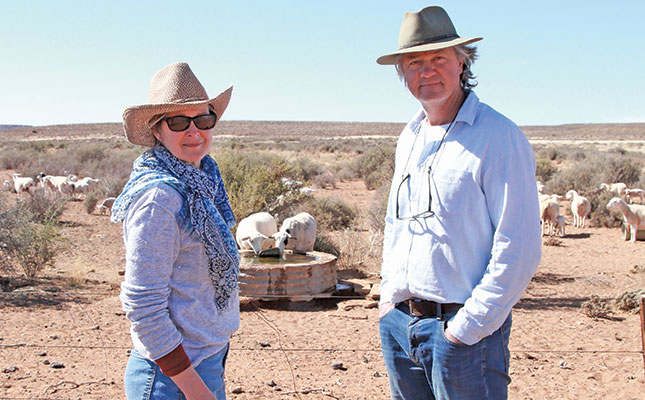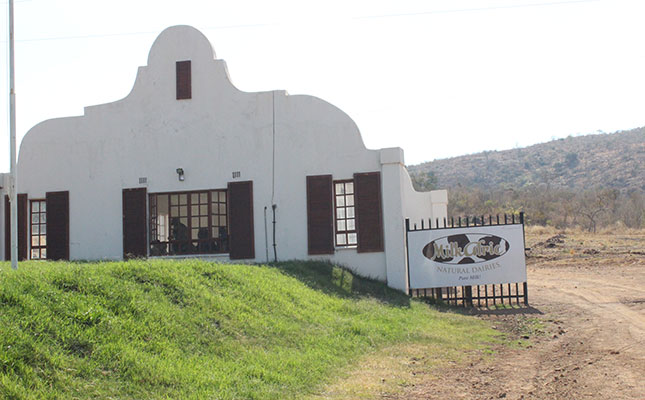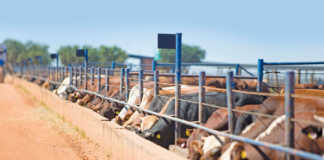
Photo: Wouter Kriel
Peter Schoeman’s family, the Van Schalkwyks on his mother’s side, has been farming sheep in the Williston area of the Northern Cape since the 1890s. Peter and Francy, however, share an interest in dairy.
“We met in Greyton in the Western Cape, where Peter was working on a dairy farm and I was dabbling in cheesemaking on the nearby farm where I worked,” Francy recalls.
They relocated to the Schoeman family farm near Williston in 2010, and started Langbaken Karoo Cheese soon thereafter.
“Langbaken was an extensive sheep farm, but the [cows’] cheese proved popular and there was strong demand for it, so we made it a serious subdivision of our farming business,” she says.
When Farmer’s Weekly first visited Francy and Peter in 2012, the couple had only just started making cheese, and little did they know at the time that this small business would become their saving grace during a six-year drought.
The Williston area has been struggling with persistent drought since 2015, and the Schoemans had to adopt a new approach to sheep farming in order to remain sustainable.
The cheese business played a crucial role in keeping the farm afloat as the drought raged on, but then COVID-19 struck in 2020. “Our cheese marketing strategy had to be adapted, as the various lockdowns and alcohol trade restrictions affected [our sales] directly,” says Francy.

Nevertheless, the Schoemans have continued investing in their cheese business and have initiated plans to expand into tourism. Peter is also perfecting the art of brewing craft beer to complement their cheese offering.
Sheep
Their land covers 5 500ha and has a long-term carrying capacity of around 600 ewes, but they had to reduce this to 500 ewes due to the drought.
“We had to cut costs as much as possible. We were very lucky to receive isolated showers of 150mm in 2019 and 150mm again in 2020. It is heartbreaking to see your neighbour in complete disaster as the rain misses their side of the fence,” says Francy.
During a prolonged drought, farmers might see some new growth after a spell of rain, but without good follow-up rain, the drought cycle is not broken and the veld never fully recovers.
“We’re not out of the woods yet,” says Peter.
“Our area has received feed donations from the rest of the country, for which we are very grateful. We use a feed mixer and hammer mill to make feed rations with whatever we receive.
“But donations are now less frequent, so we’re constantly hunting for feed bargains to keep the sheep going. You cannot continue feeding sheep mealies for eight years in a row. The veld is so decimated in many areas that there is no roughage available, and so we need to add this into the mix as well.”
The drought has heightened competition for survival in the entire ecological system, and the Schoemans are experiencing this with predation as well. As a result, the ewes are now lambing in a kraal in the farmyard. Once the lambs are strong enough, they are equipped with bells as predator deterrents.
Cows
The cheese business depends on good-quality milk. The Schoemans keep a small herd of between 12 to 15 Jersey cows in order to produce 250ℓ of milk a day.
“It’s a small-volume process; we’re not a factory,” says Peter. The cows are on a full-ration feed mix supplemented with green barley sprouts that are cultivated in a greenhouse.
“The best cheese in the world is made from [the milk of] pasture-fed cows, so we try to replicate a pasture diet in our feeding regime. It also means feeding the cows as little grain as possible. The cows’ diet is enormously important as it affects the cheese quality directly,” says Francy.
Feeding the cows is expensive, but Peter says they can afford this as they are not selling their milk at R5/ℓ.
One litre of milk makes one Camembert cheese wheel, selling at between R35 and R40, so there is a lot of value-adding in making cheese.
Cheese
“We use raw milk and aim for relatively small volumes of top-quality cheese. We can process 500ℓ at a time, so we milk for two days and make cheese every second day,” says Francy. Their commitment to quality is confirmed by the four Qualité Awards from the South African Dairy Championships that Langbaken has won, the most recent in 2020.
They have also won several international awards, including a gold medal at the World Jersey Cheese Championships for their Karoo Swiss in 2014.
The cheese business was doing well and added vital income during a time when their sheep farming operation was struggling. But then COVID- 19 struck in 2020. During several lockdown levels, government instated restrictions on the sale of alcohol.
“We experienced first-hand the direct relationship between wine and cheese sales,” says Francy.
They used to sell a lot of cheese at food and wine festivals, but those orders vanished overnight, she says. Before the first lockdown in 2020, they were also preparing stock for the South African Cheese Festival, including large quantities of soft cheeses, such as blue cheese and Camembert.
While hard and matured cheeses can be stored for a longer period, soft cheeses have a short shelf life. As such, the Schoemans have to manage volumes very carefully. Due to COVID- 19, the cheese festival was cancelled, and Francy says it was terrible to see all the cheese going to waste as there was simply no alternative market at such short notice.
During lockdown, they dried a few of their cows to reduce milk volumes, but they never stopped making cheese.
“We’ve been able to keep all our staff employed during this time,” says Francy. “However, we had to rethink our marketing approach. Before the pandemic, we used to sell cheese in bulk, normally 5kg wheels, to a handful of large customers, who then supplied predominantly restaurants and wine-tasting venues.
“But due to COVID-19 restrictions, restaurants were closed and there were no wine sales, so these clients disappeared.”
They decided to reach out to food clubs and individuals with the help of social media. As whole cheeses are too large for individual clients, they started cutting and vacuum-packing the cheese into smaller units. Where they used to have seven large clients, they now have more than 20 new clients, buying in smaller units.
Francy says one of the challenges was to get the balance right between soft and hard cheese.
“Initially, we placed too much focus on hard cheeses, but these cheeses need time to mature, tying up cash flow and storage space. Soft cheese, on the other hand, is sold quickly, clearing up storage space and generating much-needed cash.”
One of the ways in which they found this balance is through the production of their Williston cheese, a new sweet-milk cheese that Francy developed.
“The Williston is an English tomme-type cheese that we can sell within four to six weeks after production,” she says.
Beer
“We love travelling, and when we do, we make an effort to visit craft breweries as there are always interesting local stories and personalities attached to the beers. Beer and cheese go very well together,” says Francy. They started making their own beer about three years ago, and Peter is getting better and better with each batch, says Francy.
“I do about 25ℓ at a time, making three batches a day when I’m brewing. It is enough to cater for visitors and to serve as a complementary product to our cheese,” says Peter.
“We’re in the process of applying for a microbrewery licence. Langbaken Karoo Brew is the name we have decided on,” he adds.
Tourism
Due to the COVID-19 travel restrictions that have made global travel difficult, local tourism is experiencing a boom, and people are supporting local products. To capitalise on this demand, the Schoemans have started constructing a tasting centre where people can sit and eat cheese and drink their beer. They are also planning to add guest cottages and a camping site on the farm.
“We want to offer a total and unique hospitality experience: Karoo scenery, meat, cheese and craft beer,” says Francy.
Email Peter and Francy Schoeman at [email protected], phone Peter on 082 550 4981, or WhatsApp Francy on 082 346 5780.











